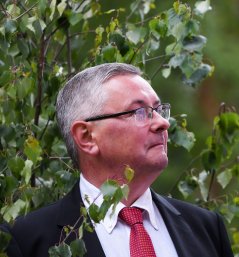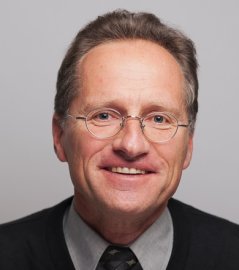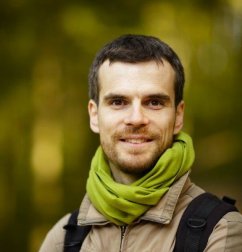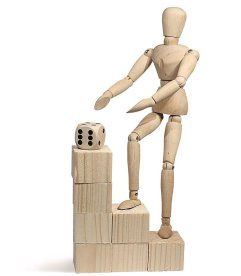Tomass Kotovičs is Deputy leader of UNECE/FAO Forest Communicators Network, also the Head of Communication Department of JSC "Latvia's State Forests". In his key-note speech he adressed the challenges of communication that he faces daily when working with forest issues both on national and international level. The audience had a possibility to reflect on the following questions:
- Does climate change accelerate bio-era and what kind of responibility lies with schools?
- How can we reestablish the deep connection between forest and people engaging schools in this process?
- What can we learn from Latvia and its forests?
Prof. Robert Vogl is a Researcher from Highschool Weihenstephan-Triesdorf, Germany. His key-note speech "Education for sustainable development by tandem of teacher and forester" included:
- Results of a 3-year-research project with 3rd degree pupils (primary school) comparing classroom learning competence improvement with outdoor forest learning competences;
- Discussion of the consequences that should be taken from this outcomes, especially concerning the cooperation school/teachers-foresters;
- Presentation of the developed learning-project ideas, which where developed and tested in Bavaria by teacher-forester tandems;
- Integration of the audience by using an online-Ted (via smartphone) to to let the audience participate at sustainability-simulations during the keynote.
Ph.D. Jan Froněk is a teacher-trainer from TEREZA Educational centre, Czech Republic. Besides coordinating the international "Learning about forest" (LEAF) programme among 380 Czech schools, he also teaches social psychology at Charles University in Prague and runs coaching trainings for school headteachers. His key-note speech was based on interaction with the audience:
- How to link the forest pedagogy programmes and the regular school? Both forest pedagogues and school teachers are invited to share their ideas.
- What makes forest education successful? It is presumed that efficient outdoor learning event must be well planned, well structured and well reflected on and followed up at school. Isolated events are less useful. However, there is seemingly lack of real life examples available.
- So let´s come up with some good examples from various countries to share and inspire new ideas of how to make the learning connections stronger for children.
Pecha-Kucha is a form of presentation that consists of 20 Powerpoint slides that are shown automatically 20 seconds each. So one Pecha-kucha presentation is only about 6 min short, plus - there is a space for discussion. This form is widely used in architecture and design. In the congress day of July 3rd in Tērvete several key-note speakers from Latvia used it to design visions about the future schools and forests – creating bridges for the next generations:
- Daiga Brakmane and Mihails Basmanovs, Project “School 2030”
-
 PRESENTATION AVAILABLE
PRESENTATION AVAILABLE - Kristaps Ceplis, NGO “Green Homes”
-
 PRESENTATION AVAILABLE
PRESENTATION AVAILABLE - Paula Reine and Līva Ūlande, 11th grade students of Jelgava Spidola State Gymnasium, LVM School of Bioeconomics
-
 PRESENTATION AVAILABLE
PRESENTATION AVAILABLE






